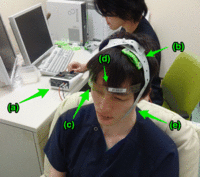Transcranial direct-current stimulation

Transcranial direct-current stimulation (tDCS) is a medical treatment that uses small currents of electricity to stimulate the brain. It works by attaching two electrodes, or tiny wires, to the head and then sending a very small amount of electricity between them. This electricity goes through the brain and changes the way that the brain cells work.
Think of it like a light switch that can turn the brain cells "on" or "off." When the switch is "on," the brain cells become more active and communicate with each other more easily. When the switch is "off," the brain cells become less active and communicate with each other less.
Doctors can use tDCS to treat a wide range of mental health conditions, including depression, anxiety, and chronic pain. They can also use it to improve cognitive function, such as memory and attention.
The treatment is very safe because the amount of electricity used is very small, and it does not cause any pain or discomfort. The only thing you might feel is a slight tingling sensation on your scalp where the electrodes are attached.
Overall, tDCS is a very effective way to improve brain function and relieve mental health symptoms. It works by using a gentle electrical current to switch on or off different parts of the brain, which can lead to better mental health and cognitive functioning.
Think of it like a light switch that can turn the brain cells "on" or "off." When the switch is "on," the brain cells become more active and communicate with each other more easily. When the switch is "off," the brain cells become less active and communicate with each other less.
Doctors can use tDCS to treat a wide range of mental health conditions, including depression, anxiety, and chronic pain. They can also use it to improve cognitive function, such as memory and attention.
The treatment is very safe because the amount of electricity used is very small, and it does not cause any pain or discomfort. The only thing you might feel is a slight tingling sensation on your scalp where the electrodes are attached.
Overall, tDCS is a very effective way to improve brain function and relieve mental health symptoms. It works by using a gentle electrical current to switch on or off different parts of the brain, which can lead to better mental health and cognitive functioning.
